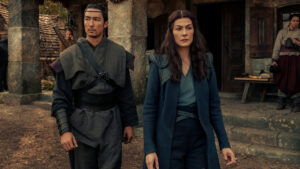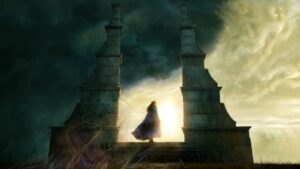MINOR SPOILERS FOR THE WHEEL OF TIME EPISODE ONE AHEAD!
For the past decade or so, the fantasy genre has been dominated to such an extent by HBO’s Game Of Thrones that it appears as though many professional critics no longer remember what came before. So they dissect every new fantasy series looking for similarities to Game Of Thrones, and inventing said similarities even when there are none. The Witcher? A Game Of Thrones rip-off, clearly. Shadow And Bone? A young-adult Game Of Thrones. The Wheel Of Time? Uh, Game Of Thrones but…uh, more wholesome, I guess?

The reference-point they’re looking for (in the latter case) is The Lord Of The Rings. To be honest, it’s downright annoying that critics feel the need to endlessly compare vastly different works in the same genre at all, especially as fantasy is rapidly expanding to be more diverse than ever and the writings of cisgender heterosexual white men are no longer automatically the gold-standard by which we judge everything else. But even leaving that aside, comparing The Wheel Of Time to Game Of Thrones is absurd. The first installment in Robert Jordan’s sprawling fourteen-book series is intentionally modeled after The Lord Of The Rings.
Later on in the series, perhaps, one could argue that Jordan’s increasingly complex spiderweb of crisscrossing subplots was more reminiscent of Game Of Thrones‘ intricate storytelling than The Lord Of The Rings‘ relatively straightforward quest narrative, but Amazon’s The Wheel Of Time is only on season one – which means we haven’t gotten anywhere close to the point where a Thrones comparison is even relevant, much less accurate. The Wheel Of Time‘s first episode is actually so simplified that my biggest criticism is that it feels deceptively generic, stripped bare of almost any unique embellishment to distinguish it from The Lord Of The Rings.
Perhaps recognizing that the monumental scope of Jordan’s series could alienate casual viewers or audiences new to the fantasy genre, Wheel Of Time starts off with a bare-bones plot and as little lore-heavy exposition as possible – basically all we learn from episode one is that “the Dark One is waking”, which is a vague yet familiar concept, and that one of the four main characters is prophesied to be “the Dragon” who can stop the aforementioned Dark One. There’s no way of narrowing down which character is the Dragon (although book readers will know the answer), because they’re all roughly the right age to fit the prophecy, and the Dragon could be any gender.
What Jordan did with these well-worn tropes was deconstruct them in various ways, but unless you know that going into the show I worry that some new viewers might be turned off by what sounds like a basic plot. There are plenty of worldbuilding details and story elements unique to The Wheel Of Time that could have been sprinkled in throughout this episode, not distracting from the narrative but enriching it and giving viewers a reason to keep watching for something they haven’t seen before onscreen, rather than the promise of deconstructing tropes they already have.
The one area where Wheel Of Time stood out from the crowd when the first book was published was in the series’ exploration of gender roles, and one would think that Amazon’s series would lean into that more, given the focus it received in the marketing, and the top billing given to Rosamund Pike as Moiraine Damodred, an Aes Sedai on a mission to find the Dragon. To be fair, episodes two and three (released simultaneously with the premiere) do a much better job of explaining the rift between women and men in this world, but episode one only gives a handwavy explanation of who the Aes Sedai are, why women alone can use magic in this world, and what happened so that men can’t.
Yet even so, Amazon’s depictions of women in The Wheel Of Time are effortlessly superior to Jordan’s, at least insofar as it feels like the women of Amazon’s series are real people with some thought and care put into their individual characterizations. Reading Jordan’s books, it sometimes feels like he pulled at random from a grab-bag of sexist stereotypes to flesh out his female characters, which in turn dilutes whatever message he was trying to send (I said his books explored the subject of gender roles, but you could build a strong argument for why they also reinforce them).
Fantasy and sci-fi in particular are two genres that have always had a problem with sexism, and that doesn’t magically go away during the transition from literature to film and television without writers behind the scenes advocating for updates to the source material. Based on showrunner Rafe Judkins’ previous work on Agents Of S.H.I.E.L.D., I do trust him to make those decisions on his own, but I’m very glad that his writers room for season one also included three women; one of whom, Celine Song, is credited as having written four episodes – the most of any writer on the series. The result is that Wheel Of Time‘s dynamic female characters are its highlight.

That being said, this is something that only becomes gradually clear throughout the first three episodes. Episode one, in and of itself, skimps a little on characterizations…which is weird, seeing as there’s not enough actual plot packed into these fifty-four minutes to warrant doing anything else with all that screentime. The women do still manage to steal the spotlight, however, particularly Moiraine, who keeps the people of the Two Rivers on edge with her disarming personality, and Egwene al’Vere (Madeleine Madden), whose journey of self-discovery is followed so closely by director Uta Briesewitz’s camera that whether intentionally or not she comes across as the lead.
We’re introduced to Egwene and expected to focus on her before we even hear of Rand al’Thor (Josha Stradowski), or Mat Cauthon (Barney Harris, whose performance you’ll want to enjoy while it lasts – he’s been recast for season two), or Perrin Aybara (Marcus Rutherford), while Nynaeve al’Meara (Zoë Robins) doesn’t get enough attention in this episode to foreshadow her significance down the line. Throughout the battle with the beastly Trollocs, we remain centered on Egwene as her reality crashes down in flames around her, and it’s through her wide eyes that we witness Moiraine’s first staggering display of power.
When we cut back to Rand and his father Tam (Michael McElhatton), their fight with a Trolloc – through which Jordan narrowed the scope of the entire battle to just two people fighting to survive one harrowing night in the mountains – is an interlude between scenes of Egwene’s experiences. We briefly follow Mat and Perrin as they weave in and out of the battle, but I never felt like the show knew exactly to do with Mat, and Perrin’s storyline in this first episode features an overused trope which, unless subverted soon, will continue to grate on me every time it’s brought up again.
Egwene obviously benefits immensely from this change. But if there’s an unfortunate side-effect, it’s that Rand and Tam’s entire relationship is cut down to just three scenes in which we barely get to know anything about them. I loathed Rand in the books, but here I think he could be a more interesting and likable character (episode three, in particular, proves that) if we got a little more time to connect with him.
Amusingly, Wheel Of Time doesn’t have enough time to tell its story. I’m not saying that the episodes need to each be over an hour long (although with only eight episodes in this first season, they might want to consider it), but the premiere certainly should have been. We bounce from scene to scene before having a chance to process anything, and as a result the characters’ personal lives feel underdeveloped. Egwene’s romantic relationship with Rand, which we enter just as both characters are starting down diverging paths, is a clear example of this; reduced to a scattering of interactions that give us no indication of why they loved each other in the first place and why we should care that they no longer do.
Between that, Mat’s standard-issue broken family, and Perrin’s listless relationship with his wife (a character invented for the show), the first episode drags quite a bit as it rotates between these subplots, at least until the Battle of Bel Tine begins. That’s also when Moiraine and her Warder Lan (Daniel Henney) finally stop hovering on the sidelines and get involved. Moiraine’s battle with the Trollocs, accompanied by Lorne Balfe’s eerie and powerful score, is a thing of beauty – we’ve seen magic onscreen countless times before, but Wheel Of Time‘s complex system of “channeling” is completely new.
Amazon’s fight choreographers and VFX team interpret channeling very literally – Moiraine bends into the One Power as gently as a tree in the wind, and performs a kind of slow-motion dance as she wields it, leaning in whichever direction she wants the power to go and letting it flow through her body, forming a channel with her outstretched arms and hands. It’s mesmerizing to watch. The magic itself, comprised mostly of glowing white threads, wouldn’t be all that interesting without Rosamund Pike’s incredible physical performance – although I liked that when Moiraine summons the One Power to her, it spills in luminous rivulets from everything in the area, even the ancient stones used to build the village inn.
The production values are incredible, of course. Amazon may have devoted more money and resources to their adaptation of The Lord Of The Rings, but The Wheel Of Time didn’t come cheap either, and it only occasionally looks less than cinematic when its expansive sets and locations are bathed in that unnaturally bright TV lighting that gives everything an artificial sheen. If the costumes don’t look as lived-in as one would expect, only Nynaeve’s vivid gray-green coat is actually distracting in the moment. But that’s not to say the other costumes look good. Moiraine’s traveling gear is the only fashion so far that I could see making an appearance at Halloween parties next year.

As I close this review, I realize that it might sound harsh, but please keep in mind that I’m reviewing episode one separately from two and three (and if I have time, I’ll review both those episodes in the coming days). Wheel Of Time doesn’t take long to improve significantly, and by the end of episode two I was heavily invested in the story and most of its characters. Episode one on its own, however, isn’t great – it’s fine, but it’s diluted to the point where it sometimes feels more like a bland rip-off of The Lord Of The Rings than the book, which is…impressive.
And amusing, seeing as Amazon has its own Lord Of The Rings adaptation coming up, and it will be completely different from the story most people are familiar with – in fact, possibly more like what Wheel Of Time will become. Me, I’m just happy that in the wake of Game Of Thrones, the fantasy genre on TV continues to expand and diversify, giving us fans plenty of content from which to choose our new obsessions.
Episode Rating: 6.5/10